Abstract
Objective
To study the new ISPAE guidelines in neonates with congenital hypothyroidism and present authors’ experience in managing these neonates.
Methods
A retrospective review of all babies who were screened for congenital hypothyroidism in the institution over a period of 5 y was conducted. Details pertaining to maternal risk factors, neonatal risk factors, screening TSH, venous TSH and details of etiological evaluation including: ultrasound thyroid, technetium 99m scintigraphy and anti thyroid peroxidase antibody estimation were retrieved. The cases were assessed using the new ISPAE guidelines.
Results
During the study period, 8107 babies were screened for congenital hypothyroidism, 83 cases had confirmed disease and 47 had established etiology. There is a fair correlation between screening TSH and venous TSH (r = 0.7, p < 0.05). The estimated incidence of congenital hypothyroidism in present series is 1 in 97 cases. Out of the 83 cases, 36 (43.3%), 16 (19.2%) and 31 (37.3%) cases had screening TSH >20 μIU/mL, 6-20 μIU/mL and < 6 μIU/mL, respectively. Out of the 47 babies with screening TSH <20 μIU/mL, 23 (48.9%), 25 (53.1%) and 12 (25.5%) cases had prematurity, maternal thyroid disease and illness, respectively, as risk factors (some babies had more than one risk factor). Of the 83 cases, all of them had venous TSH >10 μIU/mL and five cases had low Free T4 (<1.1 ng/dl). Thus, none of the cases with congenital hypothyroidism were missed on the new ISPAE guidelines.
Conclusion
The new ISPAE guidelines for neonatal screening for congenital hypothyroidism are very useful and applicable in Indian neonates.


Similar content being viewed by others
Change history
17 September 2021
A Correction to this paper has been published: https://doi.org/10.1007/s12098-021-03916-0
References
Prezioso G, Giannini C, Chiarelli F. Effect of thyroid hormones on neurons and neurodevelopment. Hormone Res Pediatr. 2018;90:73–81.
Léger J, Olivieri A, Donaldson M, et al. ESPE guidelines on screening, diagnosis and management of congenital hypothyroidism 2014. J Clin Endocrinol Metab. 2014;99:363–84.
Rose SR, Brown RS, Foley T, et al. Update of newborn screening and therapy for congenital hypothyroidism. Pediatrics. 2006;117:2290–303.
Manglik AK, Chatterjee N, Ghosh G. Umbilical cord blood TSH levels in term neonates: a screening tool for congenital hypothyroidism. Indian Pediatr. 2005;42:1029–32.
Prabhu SR, Mahadevan S, Jagadeesh S, Suresh S. Congenital hypothyroidism: recent Indian data. Indian J Endocrinol Metab. 2015;19:436–7.
Kaur G, Srivastav J, Jain S, et al. Preliminary report on neonatal screening for congenital hypothyroidism, congenital adrenal hyperplasia and glucose-6-phosphate dehydrogenase deficiency: a Chandigarh experience. Indian J Pediatr. 2010;77:969–73.
Gopalakrishnan V, Joshi K, Phadke S, Dabadghao P, Agarwal M, Das V. Newborn screening for congenital hypothyroidism, galactosemia and biotinidase deficiency in Uttar Pradesh, India. Indian Pediatr. 2014;51:701–5.
Lakshminarayana SG, Sadanandan NP, Mehaboob AK, Gopaliah LR. Effect of maternal and neonatal factors on cord blood thyroid stimulating hormone. Indian J Endocrinol Metab. 2016;20:317–23.
Sanghvi U, Diwakar KK. Universal screening for congenital hypothyroidism. Indian Pediatr. 2008;45:331–2.
Devi AR, Naushad SM. Newborn screening in India. Indian J Pediatr. 2004;71:157–60.
Desai MP, Sharma R, Riaz I, Sudhanshu S, Parikh R, Bhatia V. Newborn screening guidelines for congenital hypothyroidism in India: recommendations of the Indian Society for Pediatric and Adolescent Endocrinology (ISPAE) - part I: screening and confirmation of diagnosis. Indian J Pediatr. 2018;85:440–7.
Sudhanshu S, Riaz I, Sharma R, Desai MP, Bhatia V. Newborn screening guidelines for congenital hypothyroidism in India: recommendations of the Indian Society for Pediatric and Adolescent Endocrinology (ISPAE) - part II: imaging, treatment and follow-up. Indian J Pediatr. 2018;85:448–53.
Rovelli R, Vigone MC, Giovanettoni C, Passoni A, Maina L, Corrias A. Newborn of mothers affected by autoimmune thyroiditis: the importance of thyroid function monitoring in the first months of life. Italian J Pediatr. 2010;36:24.
Molina MCT, Martín MJR, de Juan RJ, Segura SA. Enfermed adtiroidea autoinmunitaria materna: repercusiónen el reciénnacido [Maternal autoimmune thyroid disease: relevance for the newborn]. Med Clin (Barc). 2015;144:297–303.
Silva SA, Chagas AJ, Goulart EM, et al. Screening for congenital hypothyroidism in extreme premature and/or very low birth weight newborns: the importance of a specific protocol. J Pediatr Endocrinol Metab. 2010;23:45–52.
Bijarnia S, Wilcken B, Wiley VC. Newborn screening for congenital hypothyroidism in very-low-birth-weight babies: the need for a second test. J Inherit Metab Dis. 2011;34:827–33.
Vigone MC, Caiulo S, Di Frenna M, Ghirardello S, Corbetta C. Evolution of thyroid function in preterm infants detected by screening for congenital hypothyroidism. J Pediatr. 2014;164:1296–302.
Olivieri A, Corbetta C, Weber G, Vigone MC, Fazzini C, Medda E. Congenital hypothyroidism due to defects of thyroid development and mild increase of TSH at screening: data from the Italian National Registry of infants with congenital hypothyroidism. J Clin Endocrinol Metab. 2013;98:1403–8.
Acknowledgements
The authors acknowledge Prof. Nedunchelian Krishnamoorthy, Department of Research, Mehta Multispeciality Hospitals India Pvt. Ltd., for reviewing this manuscript.
Author information
Authors and Affiliations
Contributions
SP and AS were clinicians involved in data collection. HKP, LV, GM and RS were clinicians involved in the care of the subjects. All authors contributed to the manuscript. HKP shall act as a guarantor of the study and be the corresponding author.
Corresponding author
Ethics declarations
Conflict of Interest
None.
Additional information
Publisher’s Note
Springer Nature remains neutral with regard to jurisdictional claims in published maps and institutional affiliations.
The original version of the article was revised: The statement: “Out of the 83 cases, 36 (43.3%), 26 (31.3%) and 21 (25.3%) cases had screening TSH >20 μIU/mL, 6-20 μIU/mL and < 6 μIU/mL, respectively. should read as the follows: Out of the 83 cases, 36 (43.3%), 16 (19.2%) and 31 (37.3%) cases had screening TSH >20 μIU/mL, 6-20 μIU/mL and < 6 μIU/mL, respectively.
Rights and permissions
About this article
Cite this article
Venugopalan, L., Paranjyothi, S., Sankaran, A. et al. Utility of the New Indian Society of Paediatric and Adolescent Endocrinology (ISPAE) Guidelines for Congenital Hypothyroidism Screening in a High Risk Unit. Indian J Pediatr 88, 1075–1079 (2021). https://doi.org/10.1007/s12098-020-03555-x
Received:
Accepted:
Published:
Issue Date:
DOI: https://doi.org/10.1007/s12098-020-03555-x




